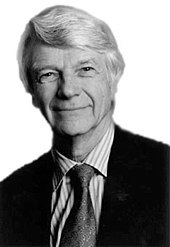This article may require copy editing for grammar, style, cohesion, tone, or spelling. (October 2023) |

| Part of a series on |
| Discrimination |
|---|
 |
Ageism[1][2][3] is a type of discrimination based on one's age, generally used to refer to age based discrimination against the elderly. The term was coined in 1969 by Robert Neil Butler to describe this discrimination, building on the terminology of sexism and racism.[4] Butler defined ageism as a combination of three connected elements: negative attitudes towards old age and the ageing process, discriminatory practices against older people, and institutional practices and policies that perpetuate stereotypes about elderly people.[5][6]
The term "ageism" is also used to describe the oppression of younger people by older people. An example is a 1976 pamphlet published by Youth Liberation of Ann Arbor, MI.[7] In the UK, at a meeting of the Bracknell Forest Council in June 1983, councillor Richard Thomas pointed out that age discrimination works against younger and older people.[8] This includes the practice of denying younger people certain rights and privileges usually reserved for adults. These include the right to vote, run for political office, refuse medical treatment, and sign contracts.[9] This definition of ageism can also include ignoring the ideas and contributions of adolescents and children because they are considered "too young" or dismissing their behavior as caused by their age. Ageism against the young also includes penalties, burdens, or requirements imposed exclusively (or to a greater degree) on young people than on older people, such as age-based military conscription.[10]
In a youth-oriented society, however, older people bear a large proportion of age bias and discrimination. Older people themselves can be ageist, having internalized a lifetime of negative stereotypes about aging.[11] Ageism is often connected to fears of death and disability- with avoiding, segregating, and rejecting older people functioning as a coping mechanism to avoid these concepts.[12] There is a large overlap between ageism and ableism, discrimination based on disability.
- ^ "Ageism and Aging". www.achca.org. Retrieved 18 February 2023.
- ^ Weir, Kirsten (1 March 2023). "Ageism is one of the last socially acceptable prejudices. Psychologists are working to change that". Monitor on Psychology. American Psychological Association. Archived from the original on 28 January 2024.
- ^ Riddiough, Christine (22 August 2020). "Ageism is real. It's time we fought it". Democratic Socialists of America. Archived from the original on 8 July 2023.
- ^ Butler, R. N. (1969). "Age-ism: Another form of bigotry". The Gerontologist. 9 (4): 243–246. doi:10.1093/geront/9.4_part_1.243. PMID 5366225. S2CID 42442342.
- ^ Wilkinson J and Ferraro K, Thirty Years of Ageism Research. In Nelson T (ed). Ageism: Stereotyping and Prejudice Against Older Persons. Massachusetts Institute of Technology, 2002
- ^ Cite error: The named reference
Karlssonwas invoked but never defined (see the help page). - ^ Shelley Ettinger (September 1976). "The Bottom Rung" (PDF). FPS: A Magazine of Young People's Liberation (54 (Growing Up Gay)). Ann Arbor, MI: Youth Liberation Press: 8. Archived (PDF) from the original on 16 August 2024. Retrieved 16 January 2022.
- ^ Techera, Philip (13 January 2022). "NURS 3325 Module 1 Discussion Ageism". NursingPaperSlayers. Archived from the original on 29 September 2022. Retrieved 29 September 2022.
- ^ "Discrimination Against Youth Voice". freechild.org. 7 January 2016. Archived from the original on 26 June 2018. Retrieved 1 May 2018.
- ^ Hasbrouck, Edward (Summer 2021). "Youth Liberation and Military Conscription". Peace Chronicle. Peace & Justice Studies Assoc. Archived from the original on 16 August 2024. Retrieved 16 January 2022.
- ^ "Youthful Indiscretions" Archived 27 January 2016 at the Wayback Machine. kingsreview.co.uk. Retrieved on 11 September 2015.
- ^ Friend, Tad (13 November 2017). "Why Ageism Never Gets Old". The New Yorker. ISSN 0028-792X. Archived from the original on 22 March 2023. Retrieved 28 November 2017.